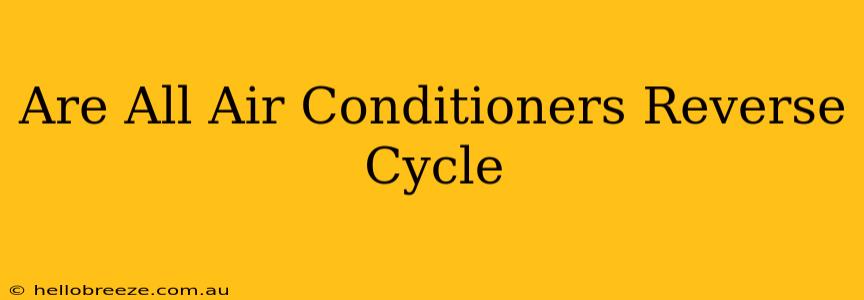Are All Air Conditioners Reverse Cycle? Understanding Heating and Cooling Systems
The short answer is no, not all air conditioners are reverse cycle. While many modern air conditioning units offer reverse cycle functionality, a significant number only provide cooling. Let's delve deeper into what reverse cycle means and explore the differences.
What is a Reverse Cycle Air Conditioner?
A reverse cycle air conditioner, also known as a heat pump, uses a single system to both heat and cool your home. It works by reversing the refrigerant flow through the system. In cooling mode, it extracts heat from inside your home and releases it outside. In heating mode, the process is reversed, drawing heat from the outside air and transferring it indoors.
Key Advantages of Reverse Cycle Systems:
- Efficiency: Often more energy-efficient than traditional heating systems, especially in milder climates.
- Cost-effective: Can reduce overall energy bills by handling both heating and cooling.
- Space-saving: A single unit handles both functions, eliminating the need for separate heating and cooling systems.
- Cleanliness: Often uses cleaner energy sources compared to gas or oil heating.
Types of Air Conditioners: Beyond Reverse Cycle
While reverse cycle systems are becoming increasingly popular, several other types of air conditioners exist:
-
Single-function air conditioners: These units only provide cooling. They are typically less expensive upfront but require a separate heating system. They're a common choice in regions with hot summers and mild winters.
-
Window air conditioners: These are typically single-function units designed for individual rooms. They are portable and budget-friendly but may not be as efficient as central systems.
-
Portable air conditioners: These also generally only offer cooling and are suitable for single rooms. They require venting to remove warm air.
-
Central air conditioners: These can be either single-function cooling units or reverse-cycle heat pumps, depending on the system installed. They offer whole-home climate control.
Choosing the Right System for Your Needs
Selecting the best air conditioning system depends on several factors:
-
Climate: In areas with significant heating needs, a reverse cycle system will likely be more cost-effective in the long run. Single-function units are suitable for regions with minimal heating demands.
-
Budget: The initial cost of a reverse cycle system is generally higher than a single-function unit. However, the long-term savings on energy bills can offset this initial investment.
-
Home size and layout: Central air conditioning is best suited for larger homes, while window or portable units are better for smaller spaces or individual rooms.
-
Energy efficiency ratings: Check the SEER (Seasonal Energy Efficiency Ratio) rating for cooling and HSPF (Heating Seasonal Performance Factor) for heating (if applicable) to compare energy efficiency. Higher ratings indicate greater efficiency.
Conclusion: Making an Informed Decision
Whether you need a reverse cycle air conditioner or a single-function model depends entirely on your specific requirements. Carefully considering your climate, budget, and home's needs will help you make the best decision for comfortable and energy-efficient climate control. Consulting with a qualified HVAC professional is always recommended to determine the most appropriate system for your home.

